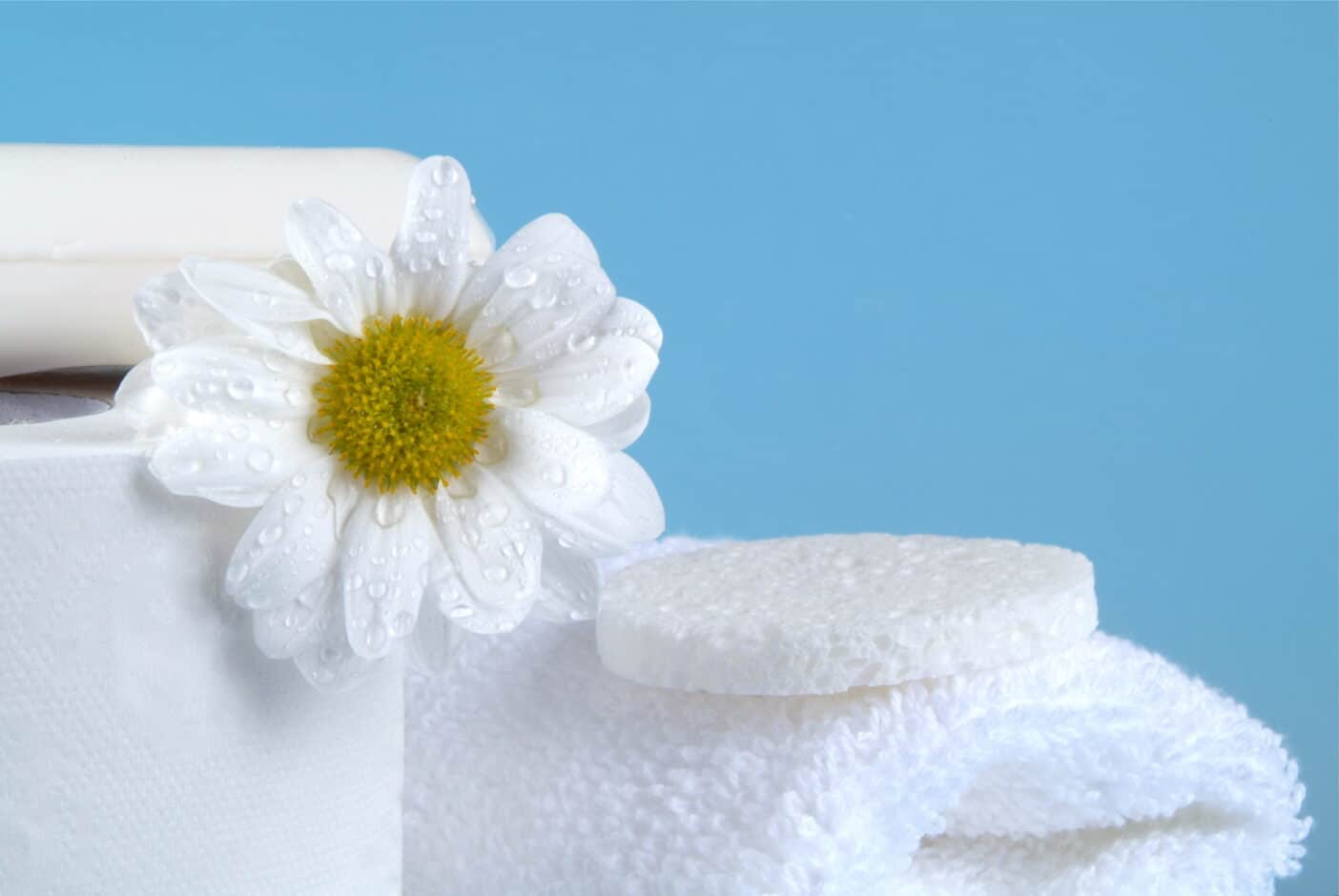Intimate hygiene

Intimate hygiene: why it is so important and what basic rules should be observed
Intimate hygiene is a sensitive topic that people still don’t like to talk about openly. And yet hygiene in the genital area is extremely important because it prevents numerous different complaints and infections and, of course, also contributes to physical well-being. If you take good care of yourself “down there”, you simply feel fresher. And intimate hygiene is actually a very simple and uncomplicated matter, isn’t it? Not quite, because mistakes are often made when it comes to intimate hygiene. One of the most common mistakes is overdoing intimate hygiene with the wrong or overly aggressive products.
Choosing the right intimate hygiene products
As a general rule, the genital area should be washed thoroughly once a day. Changing your underwear every day should also be a matter of course. However, when it comes to intimate hygiene, it is important to use products specially developed for this purpose. Conventional soaps or shower gels can attack the protective acid mantle of the skin in the intimate area. This would affect the natural bacterial flora in women in particular, making it much easier for fungi and harmful bacteria to thrive.
In principle, the following applies anyway: the correct intimate care for women and men differs greatly due to their different anatomy.
An acidic pH value is always an advantage
Women’s genitals are partly located inside the body, but in the intimate area they are in contact with the outside world. Dangers such as dehydration, fungi, bacteria and viruses do not normally bother them, however, because the acidic climate in the vagina is the best defence strategy. This effect is due to special “good” bacteria that are nourished by the vaginal mucosa and in turn produce moisture and lactic acid.
And while the lactic acid protects against intruders such as viruses and fungi, the moisture strengthens the barrier function of the mucous membrane. This is actually nature’s perfect arrangement. However, incorrect or excessive intimate hygiene can easily destroy this environment. Even the use of alkaline (basic) soaps, bath products and shower gels can have a negative effect on the acid mantle, as the vagina has a significantly lower pH value than the skin.
In the worst case scenario, a disturbed vaginal environment can lead to so-called ascending infections, which spread from the external genitalia into the vagina and then up to the cervix or even beyond.
Intimate care – better to use specialised care products
This is why it is so important for women to use special intimate care products that maintain or restore the balance in the vagina. Soothing extracts of anti-inflammatory herbs (such as camomile, calendula or sage) are well suited for female intimate care products, and the addition of lactic acid can even support the natural protective function. For women between the ages of 15 and 50, a pH value of 3.5 is also considered ideal for intimate hygiene products.
If a woman feels an unpleasant burning sensation when using intimate hygiene products, it is possible that the product is not of high quality and probably contains soap.
Intimate hygiene for men
It goes without saying that intimate hygiene also plays an important role for men. The penis, testicles and anus are washed daily and preferably in the shower under running water with a good shower gel or mild soap. But be careful: The sensitive skin in the genital area often reacts irritated and dried out when cleaned with conventional products. If men also shave their genital area regularly, small pimples can quickly form or cause unpleasant itching. Although the male genital area does not have a complex environment and therefore differs significantly from the female genital area, the skin in this part of the body is not insensitive and needs to be treated with care. By using the right products for male intimate care, the skin remains soft, smooth and healthy. The development of sores and skin irritation is prevented and any unpleasant odours are prevented.
Intimate care products for men – pH value is not so important
These products often have a moisturising formula. Ingredients such as camomile, aloe vera and thyme (considered antibacterial) are recommended in intimate care products for men, and tea tree oil (also antibacterial) is often found in soothing and cooling gels.
In contrast to female intimate care, the corresponding products for men are almost always pH-neutral.
Reminder: pH-neutral intimate hygiene products are not suitable for women.
An absolute no-go in intimate hygiene for women and men: products that contain alcohol as they are far too aggressive. Intimate sprays with artificial fragrances should also be used with caution. Not only could they cause skin irritation and also attack the protective acid mantle, they could also have the opposite effect to the one actually desired: some of the artificial fragrances react with the hair and scent glands in the intimate area, causing a rather unpleasant odour instead of the hoped-for fresh scent.
We are happy to work with these raw materials for high-quality intimate care products:
| Name | Company Name | INCI Name | Remarks |
|---|---|---|---|
| Peony Extract PB | Crodarom | Aqua , Butylene Glycol , Paeonia Officinalis Flower Extract | |
| GalFUSION Gentle Care SB | Galaxy Surfactants Ltd. | Aqua , Cocamidopropyl Betaine , Glycerin , Caprylyl/Capryl Glucoside , Sodium Methyl Cocoyl Taurate | |
| Beauté by Roquette DE 006 | Roquette | Dextrin | |
| TEGO Betain CK KB 5 MB | Evonik – Personal Care | Cocamidopropyl Betaine | |
| TEGO Betain 810 MB | Evonik – Personal Care | Capryl/Capramidopropyl Betaine | |
| CALYBIOTA BIO | Laboratoires Expanscience | Glycerin , Bombax Costatum Flower Extract , Aqua | |
| RESOLVING TGA | Sharon Personal Care Srl | Decyl Glucoside , Sodium Methyl Oleoyl Taurate , Aqua , Sodium Sesamphoacetate | |
| TEGO Betain F KB 5 | Evonik – Personal Care | Cocamidopropyl Betaine | |
| Crodarom Guava PG | Crodarom | Propylene Glycol , Aqua , Psidium Guajava Leaf Extract | |
| SENSIA CAROTA | Vytrus Biotech | Glycerin , Daucus Carota Sativa Root Cell Culture Lysate , Citric Acid | |
| SCLERIA | Jover Scientech SL | Sclerotium Gum | |
| GUAR GUM AURIST™ GHI | IFF's Health & Biosciences | Cyamopsis Tetragonoloba (Guar) Gum | |
| XYLITOL GENENCARE XL | IFF's Health & Biosciences | Xylitol | |
| BioEcolia | Solabia Group | Alpha-Glucan Oligosaccharide | |
| Dipotassium Glycyrrhizinate | Gfn-Selco | Dipotassium Glycyrrhizate | |
| Alpha-Bisabolol organic (A) | Gfn-Selco | Bisabolol | |
| Cola Teric CBS-HP | Colonial Chemical, Inc. | Cocamidopropyl Hydroxysultaine | |
| STEPAN-MILD LSB | Stepan Europe | Sodium Lauryl Sulfoacetate , Disodium Laureth Sulfosuccinate | |
| Cola Mate LA-40 | Colonial Chemical, Inc. | Disodium Lauryl Sulfosuccinate | |
| ORAMIX™ L 30 | SEPPIC | Sodium Lauroyl Sarcosinate | |
| ELAYA RENOVA | Vytrus Biotech | Glycerin , Olea Europaea (Olive) Leaf Extract , Cyclodextrin , Citric Acid , Cyamopsis Tetragonoloba (Guar) Gum , Tocopherol , Phytic Acid , Aqua | |
| EXCEPARL LM-LC | Kao Chemicals Europe, S.L. | Lauryl Lactate | |
| SOLAGUM™ AX | SEPPIC | Acacia Senegal Gum , Xanthan Gum | |
| Suga Nate 160NC | Colonial Chemical, Inc. | Sodium Laurylglucosides Hydroxypropylsulfonate | |
| BETAINE GENENCARE OSMS BA | IFF's Health & Biosciences | Betaine | |
| AQUAXYL™ | SEPPIC | Xylitylglucoside , Anhydroxylitol , Xylitol |
Intimate care products at Cosmacon
Cosmacon develops the right intimate care products for you on request: whether for men or women. You can rely on our many years of experience and our commitment to using only high-quality and gentle ingredients. Do you prefer natural cosmetics? Of course, this is also no problem. Thanks to highly effective essential oils, we are of course able to plan, develop and realise appropriate formulations according to your ideas. Just get in touch with us.
Literature:
*Maintaining vulvar, vaginal and perineal health: Clinical considerations.
Graziottin A.Womens Health (Lond). 2024 Jan-Dec;20:17455057231223716
Probiotics in Cosmetic and Personal Care Products: Trends and Challenges.
Puebla-Barragan S, Reid G.Molecules. 2021 Feb 26;26(5):1249.
